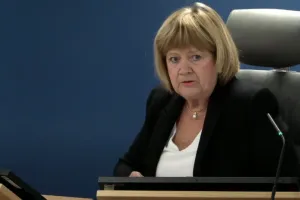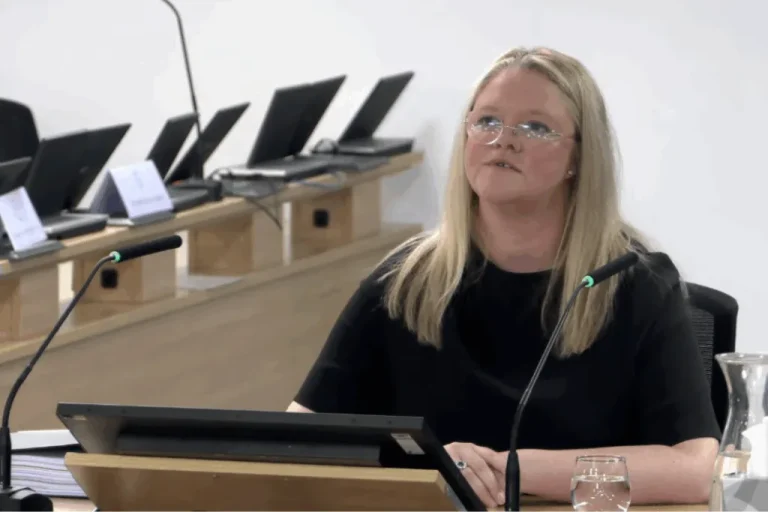Social care nurses must be given equal recognition and support to NHS workers to properly prepare for the next pandemic, an ex-care home nurse has told a public inquiry into Covid-19.
Claire Sutton, head of independent health and social care at the Royal College of Nursing (RCN), appeared at the UK Covid-19 Inquiry on Tuesday, 19 July.
“Social care often feels like a second-class citizen, a poor relative”
Claire Sutton
The inquiry recently launched its sixth module of ten, which focuses on social care, after the conclusion of evidence on topics including the impact of the pandemic on health systems, vaccinations and the resilience of the NHS when Covid-19 hit.
Ms Sutton was questioned by inquiry counsel Alice Hands on the impact of infection prevention and control (IPC) guidance, workforce shortages and other decisions made on the social care nursing workforce.
She told the inquiry that social care – before, during and after the pandemic – was sidelined in favour of a focus on the NHS by policymakers.
“Social care often feels like a second-class citizen, a poor relative,” said Ms Sutton.
“There are so many reasons for that and reasons which go widely beyond anything which could come as a recommendation from this [inquiry].
“But if we were to have parity of esteem and equity of access to the same resources and the same testing, personal protective equipment (PPE) – everything the NHS got – that would definitely support social care.”
Ms Sutton, a registered nurse with experience working in care homes, said that, particularly during the early stages of the pandemic, social care nursing staff lacked access to PPE.
She said: “[There was] definitely not [enough]. We have numerous stories… of members reporting that they were unable to have access to adequate PPE.”
The situation improved as time went on, Ms Sutton recalled, for example with the creation of distribution hubs in Scotland to give social care providers a better route for procurement.
However, Ms Sutton said that these should have been done sooner, and that this should inform future pandemic preparations.
Even where there was enough PPE, Ms Sutton said the government’s guidance betrayed a total lack of understanding of the work nurses, and other care staff, perform in nursing homes on the part of the government.

Inquiry chair Baroness Hallett
Public Health England guidance, Ms Sutton told the inquiry, was “tailored for acute hospital” settings, and “didn’t recognise social care”.
An example of this, heard by the inquiry, was in guidance as late as February 2020 which stated that care staff should avoid close contact with potentially infected people in adult social care settings – which Ms Sutton said was “impossible”.
The inquiry heard evidence throughout the session about social care nurses feeling overwhelmed and underprepared for dealing with an infectious respiratory virus outbreak in their setting.
Ms Hands asked the nurse whether she thought there was enough PPE training for adult social care nurses before the pandemic.
The RCN representative responded: “[In] the use of PPE for what they were doing day in day out – yes. But this was a very different situation.
“[In] social care.. it’s an individual’s home, they’re not acute hospital settings. So you would use PPE if you had an outbreak of norovirus, but you wouldn’t be routinely using high levels of PPE.
“There wouldn’t be routine training in the use of PPE in a hypothetical respiratory pandemic situation.
“So, no, it probably wasn’t adequate. But, yes, it was adequate for the levels of care going on day to day.”
She agreed that it would be helpful, in preparation for a future pandemic, for better training on the “rapid” response to a pandemic, regarding the use of PPE.
“I don’t think it needs to be extensive training, but a basic background of training and understanding and the ability to roll out rapid training,” she said.
“It’s so difficult to predict future pandemic characteristics, but there needs to be a background level.”
Access to testing for nurses in social care was also far worse than their NHS colleagues, the inquiry heard.
Ms Sutton said that, broadly, NHS nurses were able to access Covid-19 tests through occupational health.
By contrast, it was “very, very difficult” for members of the social care workforce to access them: “Bar a few exceptions where NHS trusts did open up their testing groups to social care staff, the social care workforce was accessing [Covid-19 tests] in the same way the general public was.”
Ms Sutton, asked for any further recommendations to the inquiry, said: “For me, if I could wish for [a number] of things for the next pandemic, because it will happen, they would be parity of access, equity of access, to training, testing and PPE, [and] to ensure that health and social care are on an equal footing.
“If there is more recognition of the social care workforce, there may be more sharing of that expertise across the settings.”
Ms Sutton then fielded further questions from lawyers representing patient groups and bereaved families.
Adam Straw KC, representing John’s Campaign, the Patients Association and Care Rights UK, asked Ms Sutton if she thought care home visitor restrictions were too tight, or if they were interpreted badly.
In response, Ms Sutton said that, in future, social care nurses should be given more freedom to interpret the rules and use their judgement on a case by case basis.
“Nurses are very good at carrying out risk assessments,” she said.
“Had there been flexibility in guidance to let nurses ascertain where a visit was safe, nurses would have been ideally placed to do this… it would be individualised, you’d make the decision based on a resident.”

